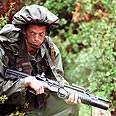
'No alternative to ground operations'
Reports of IDF raid on secret military site spark debate regarding necessity of ground operations. 'No technology can replace people when it comes to intelligence gathering,' former commando and current Meretz MK Vilan says
Reports in the foreign press regarding a raid by an elite IDF commando unit on a secret military site in Syria that took place prior to the alleged IAF overflight this month have once again sparked a debate regarding the necessity of ground operations in the modern battlefield.
In a conversation with Ynet on Sunday, Meretz MK Avshalom Vilan, a former commando, said there was no alternative to collecting intelligence on the ground.
"No technology can replace people when it comes to intelligence gathering," he said. "This holds true for the Americans as well. They learned this from their experience in Iraq, despite all of the existing technologies."
'We hear different versions every day'
According to Vilan, a ground operation, if carefully planned, is no more dangerous than any other.
"It's no surprise that we suffer casualties during infantry operations that are not intricately planned, such as in Nablus or Gaza," he said. "From my experience, the IDF does not take any unnecessary risks during operations behind enemy lines.
"In addition, every operation that takes place outside Israel's borders must be authorized by the political echelon, so usually they are launched only after careful consideration and risk-benefit analysis," Vilan said.
According to the Sunday Times, the IDF raid in Syria was aimed at collecting samples of nuclear material, but Dr Ephraim Asculai of the Jaffee Center for Strategic Studies at Tel Aviv University, who is also a former member of the International Atomic Energy Agency, said the report was "hallucinatory".
"We hear different versions of what happened every day," he told Ynet. "The report leads us to believe that the soldiers took samples of the material in a bottle and left. The nuclear material may have been enriched uranium or plutonium – it is very dangerous to transfer this material by hand.
"Furthermore, these materials are some of the most costly in the world and are usually kept in safes, especially if they were smuggled. I don't understand how (soldiers) could enter these secure labs and leave with such samples," he said.
Amnon Meranda contributed to the report










